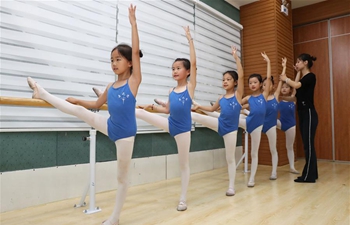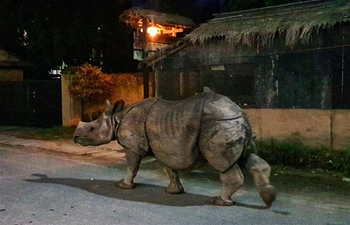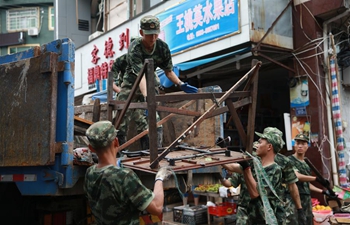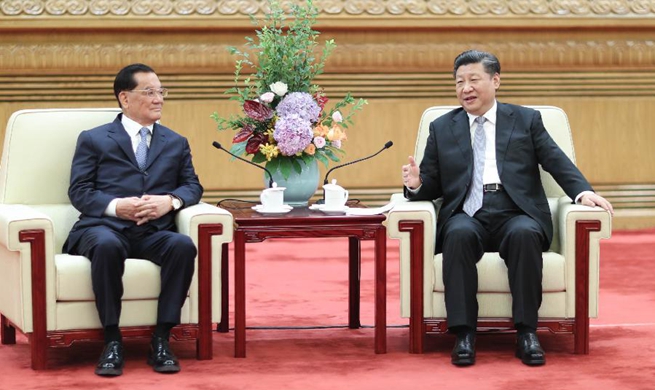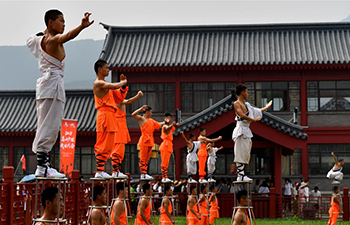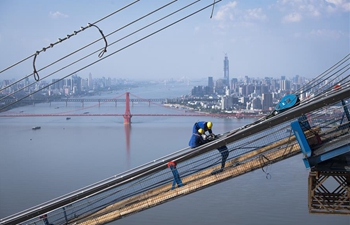FUZHOU, July 14 (Xinhua) -- Xu Jinsheng, a 39-year-old entrepreneur remembers sitting on his father's motorcycle as a child while his father looked for business partners.
Born in 1979, one year after China's reform and opening-up began, Xu is now head of SinceTech, a shoe material textile company, headquartered in Jinjiang, a textile manufacturing hub in east China's Fujian Province, a cluster of the country's most well-known sports shoe brands.
His father was among the first generation of entrepreneurs in Jinjiang. While his father's company produces machinery parts, instead of taking over his father's company, Xu chose to open his own to produce and innovate shoe materials.
"When I was little, my father would take me on his motorcycle when he met clients, I liked that feeling and hoped that I could start a business of my own when I grew up," he said.
After he got his master's degree from Loughborough University in Britain in 2004, Xu returned to Jinjiang and started the company.
For the first few years, the company produced traditional shoe materials. However, in 2011, it expanded its business and met with a bottleneck. "I told myself that we must do something different," he said.
The following year, he went to an exhibition in the United States. "I found that most companies there were from the Republic of Korea and Taiwan, and their designs were far better than ours," he said. "So I immediately told my team to step up research and make new designs."
Months later, his company came up with a new technique to make the shoe vamp, the upper part of the shoe that covers the foot, from one piece of cloth, which saved labor by allowing one worker to the work of five. They also developed skills to add designs onto the vamp.
Their new technique and designs have not only attracted the attention of major shoe companies in China, now, 60 percent of the products they produce are for international shoe brands.
"I know that my father went through hardships, and he was on trips looking for businesses for most of the time," he said. "So I learned the entrepreneurial and enduring spirit and I'm sure that I can survive at difficult times too," he said.
The company's design department has grown from none to more than 200 people in the past decade, nearly 10 percent of the company's total staff. Institute experts and top designers are invited regularly to train designers at the company.
Apart from developing new materials and making new designs, Xu also emphasizes innovation and is introducing hi-tech and big data to shoe-making.
"I'm working on smart shoes, which will be able to detect a person's walking posture and see whether it's right so that suggestions and information can then be provided for the person," he explained. "With sensors in the shoes, the smart shoes will also be able to record an athlete's movements."
By using the big data technology, the most popular color and material type can be discovered from click numbers on shoe designs.
Moreover, seeing the trend in artificial intelligence, he is thinking about using robots in his factories.
Thanks to the local government, he is able to meet other companies, reach out to top research institutes and find ways to turn his ideas into reality.
"Jinjiang now aims at innovative and international development, and the company's development has a lot to do with the city's transformation," he said.
So far, the company has established two branch offices in the United States in order to directly communicate with designers from international brands.
As president of Jinjiang Overseas Scholars and Students Association, Xu knows what the responsibility of his generation is.
"We should devote what we have learned abroad to building our hometown," he said, "It is necessary to combine traditional industries with the latest trends and bring our fathers' cause to a new level."
Established in 2014, the association now has over 430 members. Most of them are young researchers and children of the first generation of entrepreneurs in Jinjiang that have returned to their hometown after studying abroad. Their majors cover areas including finance, big data, and artificial intelligence, amongst others, and they are doing business in areas such as finance, shoe-making, clothing, food, and logistics industries.




